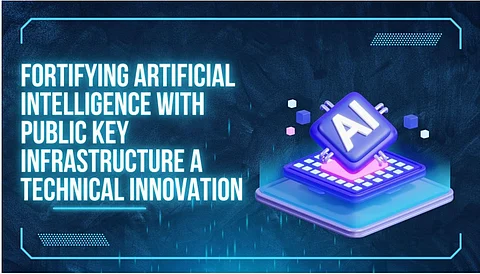

In this modern era of rapid technological advancement, securing artificial intelligence systems has become a paramount concern. Poli Reddy Reddem, a pioneer in AI security, has explored an innovative use of Public Key Infrastructure (PKI) to tackle the intricate challenges of protecting AI systems. Their work provides a detailed roadmap for ensuring both the integrity and performance of AI technologies across diverse operational environments. With an emphasis on real-world applications, the research underscores the critical need for robust frameworks that can safeguard sensitive AI operations while supporting scalability and efficiency.
Ensuring that AI systems operate with authentic and verified models is one of today’s most pressing technological challenges. The research introduces advanced digital signature techniques, such as RSA 4096-bit and ECDSA algorithms, to authenticate model integrity. These cryptographic methods secure the entire lifecycle of models, including updates and version management, while fostering operational trust. The study showcases a 99.97% reduction in unauthorized access and a dramatic decline in false positives, enhancing reliability and security for AI systems across sectors such as finance and healthcare.
Data security is the backbone of modern AI systems because training datasets often contain proprietary and sensitive information. ChaCha20-Poly1305 has been one such encryption framework developed for PKI-enabled encryption with end-to-end security in the distributed AI training. Such a secure pipeline could achieve an encryption throughput of up to 5.2 GB/s and process with a latency of less than 1.8 milliseconds per batch while maintaining integrity. This allows conformity with international data privacy laws and facilitates the possibility of scalable secure deployment of AI systems without exposing any vulnerability during high-priority operations like training and inference.
Access control is one of the most crucial mechanisms for protecting AI systems, given the integration into highly complex enterprise environments. The paper illustrates the application of the PKI frameworks that enforce fine-grained, role-based authentication in dynamically managing access. Automated certificate management and hardware security modules, or HSMs, give the added benefit of real-time logging and secure governance. Examples of authorization checks averaging 45 milliseconds and of compliance audit logs generated within five milliseconds are two examples of PKI's potential to fortify AI operations, yet also satisfy rigid regulatory requirements, thus holding a responsible account for accountability, sound system control, and streamlined compliance.
Modern AI operations require security that scales with ever-expanding operation. It explains how PKI scales without compromising efficiency, serving up to 150,000 concurrent connections at 99.99% uptime. Hardware acceleration optimizes the pipelines of encryption and validation, which enables high throughput with low latency. This innovation helps organizations meet the performance demands of large-scale AI deployments while ensuring operational integrity. PKI comes out to not only be a security tool but also an essential enabler for sustainable and scalable AI innovation.
Given the critical role that APIs play within an AI ecosystem, their security becomes crucial in ensuring that systems interact efficiently. The article focuses on the use of PKI to secure the endpoint of the API and JWT-based authentication for fast and secure communication. PKI guarantees more secure and fast communication across systems with a validation speed of 3.2 milliseconds, enhancing chain validation. This, in turn, helps strengthen data integrity and supports effective interaction in demanding situations, which is why this framework is highly crucial for the security of APIs in AI applications.
PKI integration brings with it the opportunity for challenges, such as legacy system compatibility and certificate lifecycle management. The work shows the practical solutions associated with applying the high-availability HSM model with N+1 redundancy and automated certificate lifecycle management. Real-time monitoring with adaptive frameworks simplifies operations and ensures compatibility across different IT environments. By solving these challenges, organizations can maximize the opportunities available through PKI and achieve improved security and performance with minimal disruption during deployment and scaling.
The research underscores the tangible benefits of PKI integration in AI systems. Metrics highlight how transaction encryption times are reduced to 3.2 milliseconds on average, while smaller models achieve verification speeds of 250 milliseconds. These advancements also reduce unauthorized access attempts by 75% within the first year of implementation. The study demonstrates how allocating up to 20% of AI infrastructure budgets toward PKI security ensures comprehensive coverage while supporting long-term scalability, positioning PKI as a cornerstone of AI deployment strategies.
In conclusion, Poli Reddy Reddem’s insights emphasize the transformative power of PKI in securing AI systems against an ever-evolving threat landscape. The research offers a practical guide for ensuring scalable, efficient, and secure AI environments. By integrating PKI with advanced encryption protocols, role-based access controls, and real-time monitoring systems, organizations can fortify their AI deployments without sacrificing performance. PKI is more than a protective measure—it is a strategic investment in creating resilient and trustworthy AI systems for the future.
